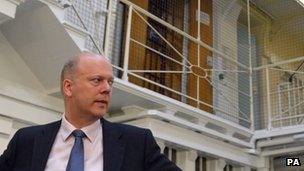Security firm G4S says it asked for police probe
- Published
- comments

Justice Secretary Chris Grayling has accused G4S of overcharging for tagging
Whether you are a fan or foe of outsourcing public services, it is impossible to ignore the government's dependence on the private sector to operate and manage swathes of what it does.
And given the many billions of pounds of contracts awarded to the likes of Serco, Capita, MITIE, ATOS and G4S - along with the big accounting firms - by all Whitehall departments and much of local government, that is not going to change in a hurry, if ever.
So it felt like quite a big moment when Chris Grayling, the justice secretary, last week put the boot into G4S and Serco, accusing them of charging too much for the business of putting electronic tags on criminals.
On contracts worth more than £100m a year, both were chastised for "wholly indefensible and unacceptable practices" in taking taxpayers' money for tags on individuals who were in prison, or were dead or no longer had to be monitored for other reasons.
Although Mr Grayling did not specify the scale of the overcharging, it was widely reported to have run to many tens of millions of pounds over the past eight years.
G4S was characterised as refusing to cooperate with the justice department's own probe, or rather one it had subcontracted to the accountants PwC, and Mr Grayling said that he had therefore felt obliged to ask the Serious Fraud Office to investigate it.
Any sense that the relationship between government and private-sector providers was one of partnership was swept away.
Traduced
Mr Grayling was the outraged customer, accusing two very big companies of ripping him off.
Given the massive reputational damage to Serco and - especially - to G4S from what Mr Grayling said in parliament, I wondered what had happened from the companies' perspective.
Of particular interest to me was how Serco and G4S had managed to alienate the government to quite such an extent.
Given that the British public sector is their biggest client by far, and their prestige client, why on earth would they want to take the risk of making that client feel exploited and traduced?
The price of making Mr Grayling cross, so far, has been a fall of around 10% in their respective share prices: not cheap. That is hundreds of millions of pounds wiped off the value of these companies, considerably more than the tagging payments they may wrongly have received.
This morning I spoke to the chairman of G4S, John Connolly. His account is of what happened is a bit different from Mr Grayling's.
In particular, he says that it was G4S, and not the Ministry of Justice, which opted for an SFO investigation.
The chain of events went like this, according to Mr Connolly.
It was six or seven weeks ago, he says, that the Ministry of Justice alerted G4S that it "had become concerned about billing on [tagging] contracts". These were contracts awarded to G4S and Serco eight years ago.
Delve deeper
The Ministry of Justice called in PwC to audit what had happened. And G4S started its own review.
"We were co-operating" Mr Connolly said. "We were clear that if we found over-billing, it would be repaid".
Then on Tuesday of last week, G4S was summoned to a meeting at the ministry. It was told that PwC's review was close to completion.
"They said to us that there was no evidence of dishonesty by individuals, but they could not rule out that there might be some" he said.
Officials also told G4S that they were thinking of calling in the Serious Fraud Office to delve deeper.
But the following evening, the ministry had "modified its position on calling in the SFO". Instead it it suggested that its preferred route was a "forensic audit" by PwC of what had happened.
The idea was also that PwC would adjudicate on whether Serco and G4S had breached the tagging contracts, thus over-riding the process for resolving disputes written into the contracts.
Mr Connolly says that at this meeting, G4S reiterated that if it became clear that the company had done something wrong, it would take action
The crunch meeting was the next morning, the Thursday morning: G4S had to decide whether to go with the PwC forensic audit or an SFO investigation.
Forensic audit

G4S boss says the dispute is over when billing for tagging starts and ends
Mr Connolly said G4S felt this was not a real choice, in that PwC and the SFO had rather different responsibilities and powers.
Strikingly, Mr Connolly says that his company decided that if the choice had to be made, it would go for the SFO review.
"Our view was that if there was evidence of wrongdoing, we would have to call in the SFO", Mr Connolly said. "We said call in the SFO".
By contrast, Serco decided to go with the PwC forensic audit.
Mr Connolly did not give a view on why Mr Grayling had not made clear that it was G4S which had opted to call in the SFO.
Mr Connolly made one other interesting point - which relates to why the overbilling happened, if it happened.
He says at the heart of the issue is a differing interpretation by the companies, on the one side, and the Ministry of Justice on the other, of clauses in the contract about "when billing starts and when billing ends".
Or to put it another way, he says the argument is about the contractually specified "mechanism" for when a billing event takes place.
Which is interesting - although some may say it is implausible that any interpretation of the contract would sanction payments for tagging dead people.
The drama is a long way from over, although Mr Connolly says his company has been told that the PwC report should be completed in days, and that G4S will then be permitted to see its main headlines - although possibly not the whole thing.
As for G4S's shareholders, they will have to decide whether the company made a strategic error in going for the SFO review, even if there was a logic to the decision.
"The problem is that the SFO investigation allowed Grayling to link G4S with fraud, even if he never accused them of fraud" said a big investor. "That is damaging for the company's reputation.
'Tainted' sector
That said, the stakes are also quite high for Mr Grayling and the Justice Department.
If it were to turn out that the scale of the overcharging was significantly less than implied, some would say needless damage had been done not only to the government's relationship with G4S but with an industry important to the functioning of the public sector.
All this has happened after the government has been forcing outsourcers to cut prices on future and current contracts - and a series of humiliations for these businesses, not least of which was G4S's failure to properly honour a commitment to provide security staff for the Olympics.
The boss of another outsourcing company - not Serco or G4S - told me the incident was tainting the sector.
This chief executive told me: "My shareholders are telling me not to touch UK government contracts with a barge pole, if I can possibly help it, that I should look for any business rather than UK government business".
Update 1733
A Ministry of Justice spokesperson said: "The Lord Chancellor has made clear that Serco and G4S were asked to comply with an independent forensic audit to rule out any wrongdoing.
G4S has refused to cooperate with that audit. This left no choice but to refer the matter to the Serious Fraud Office. The Lord Chancellor has taken full legal advice throughout the process."